Who are SSV’s Mainnet Verified Operators?
Find out who are the ssv.network Mainnet Verified Operators and learn more about the VO program and requirements.
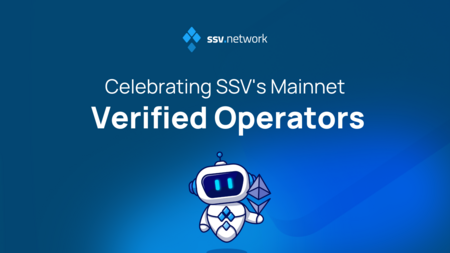
The Mainnet Verified Operators (VOs) play an essential role in the ssv.network Mainnet rollout. As we welcome the first set of participants to the landmark take-off of a DVT network, let’s have a look at who they are, how they got there, and how you can join them.
TL;DR
SSV’s Mainnet VOs are vetted industry leaders. Each of them has experience in managing validators and Ethereum infrastructure. Most importantly, they also have experience running nodes on SSV testnets, each showing top performance levels. They are highly reputed organizations, providing users with the network’s most reliable and secure service.
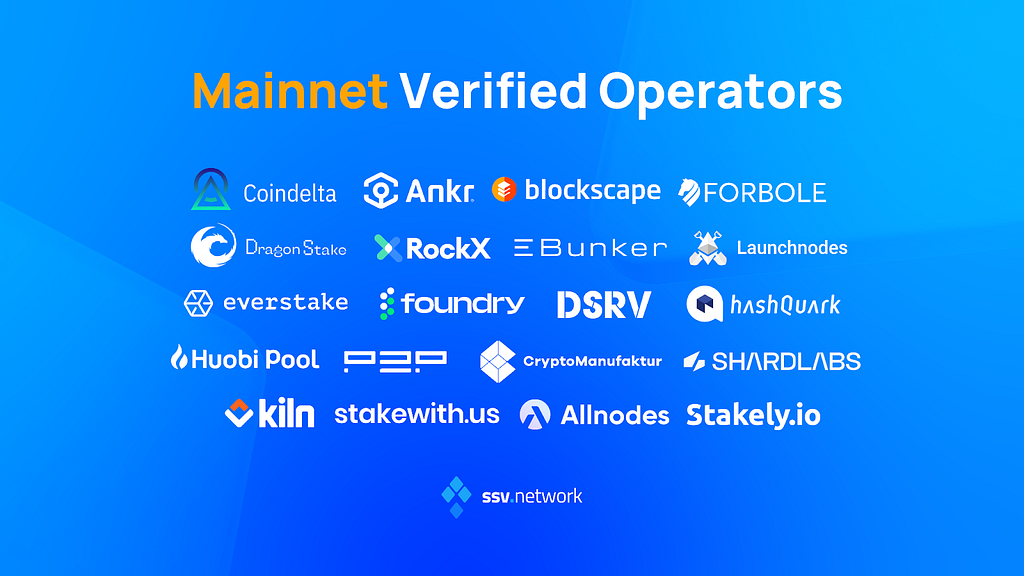
The following are the 20 Mainnet Verified Operators for ssv.network:
Ankr, Allnodes, Blockscape, Coindelta, CryptoManufaktur, DragonStake, DSRV, Ebunker, Everstake, Forbole, Foundry, HashQuark, Huobi Pool, Kiln, Launchnodes, P2P, RockX, Stakewith.us, Shardlabs, Stakely.io
The VOs started participating in Mainnet rollout during the Limited Launch and will support the protocol past the Permissionless Launch and into the future. It is essential to launch with a team of operators that are tech and software experts, rapid problem solvers, and reliable validator guardians.
In the current Limited phase, 150 validators will be distributed between random VO cluster formations, ensuring each VO manages 30 validators. VOs are testing the network alongside the core team to ensure smooth performance before the Mainnet Launch Partners arrive in the following Launch phase.
As per the SSV DAO’s green-light, the launch partners will deploy various decentralized staking applications on ssv.network. During the Launch phase, where the Total value locked (TVL) is externally generated through various staking applications, each launch partner will decide for themselves which VO they want to use for their applications.
These are the first steps in creating a robust mesh network where each participant has an entire network that can support them. It is also the realization of a concept of a fully customizable, zero-coordination network where validators can use a near infinite combination of operators according to their needs (location, clients, performance, and MEV).
Technically, it doesn’t since SSV is a completely permissionless network. But, the main reason the SSV DAO has incorporated VOs and Verified Operator Committee (VOC) is to help identify who are trusted node operators inside the network.
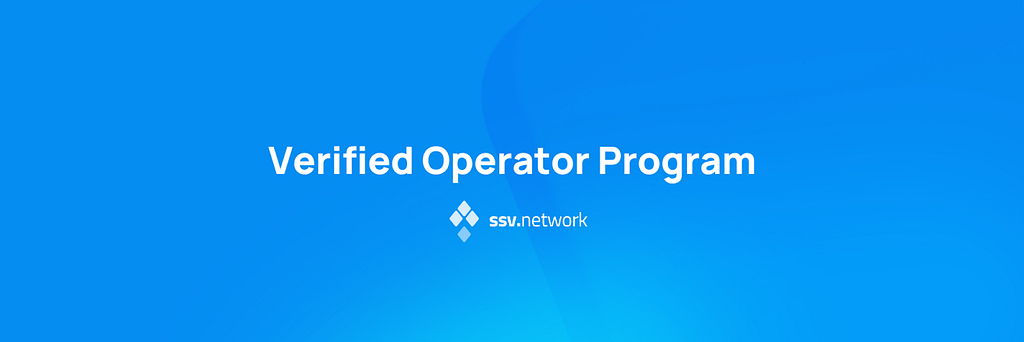
The open and permissionless nature of the network allows anyone to become an operator. So how do stakers know who is a good or trusted node operator? Besides perusing various operator performance ratings in the SSV Explorer, users can look to the VOs.
The VO green tick is a seal of approval from SSV DAO to show the VOC has done due diligence on the operator. It allows stakers to have some confidence that this is a trusted service provider they can work with. From the operator’s perspective, it improves their network visibility and, by extension, the number of key shares they may manage.
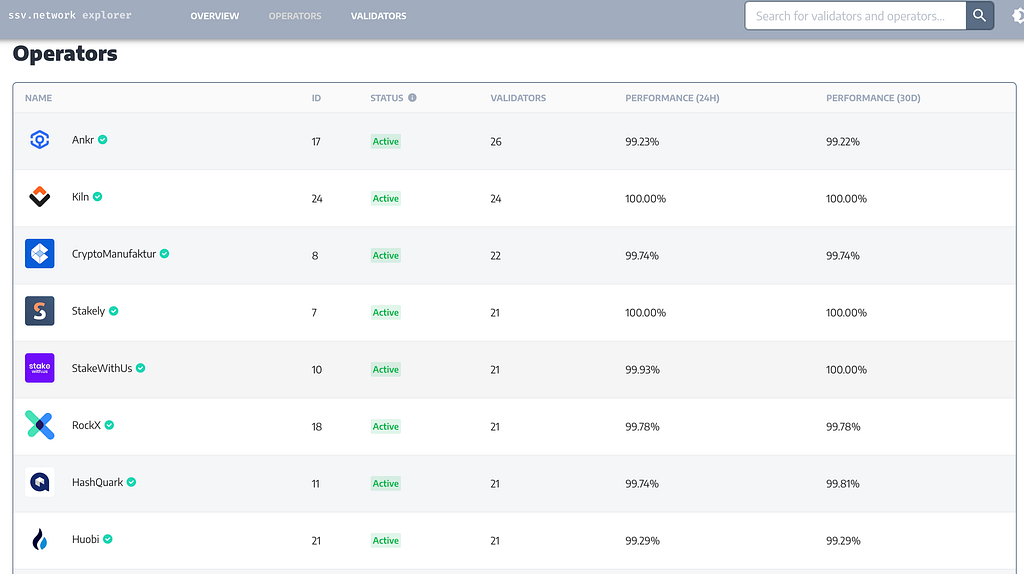
The VO program started during the early testnets (Primus testnet) when ssv.network needed operators as a base to start building the network. There were many users but not many requirements. As the testnets rolled over, some of the operators stayed on, and some didn’t. Many of the current VOs have been working with SSV for a long period of time.
Going into mainnet, it became more important to have a formalized process for setting up VOs. It’s one of the main reasons the committee was formed, to create standards and guidelines on how to work with the community and to manage standards to stay current with ssv.network and the staking industry.
To this end, the VOC developed an open and transparent methodology so large and small staking operations can use it. Not favoring anyone, but built for decentralization. These efforts enabled the DAO to build in diversity for staking clients and infrastructure; and eventually for the process to become fully automated.
For mainnet, the VO roster started with a clean slate. The application process was initiated 3 months ago and allowed people to provide information about themselves and their organizations. They were added to a scorecard and evaluated. The VO program has 45 operators now, and applications are closed until the launch.
In short, the Mainnet Verified Operators adhere to stringent security, performance, and reliability requirements as well as KYC/KYB standards. The performance of these operators is evaluated regularly to ensure ongoing quality standards.
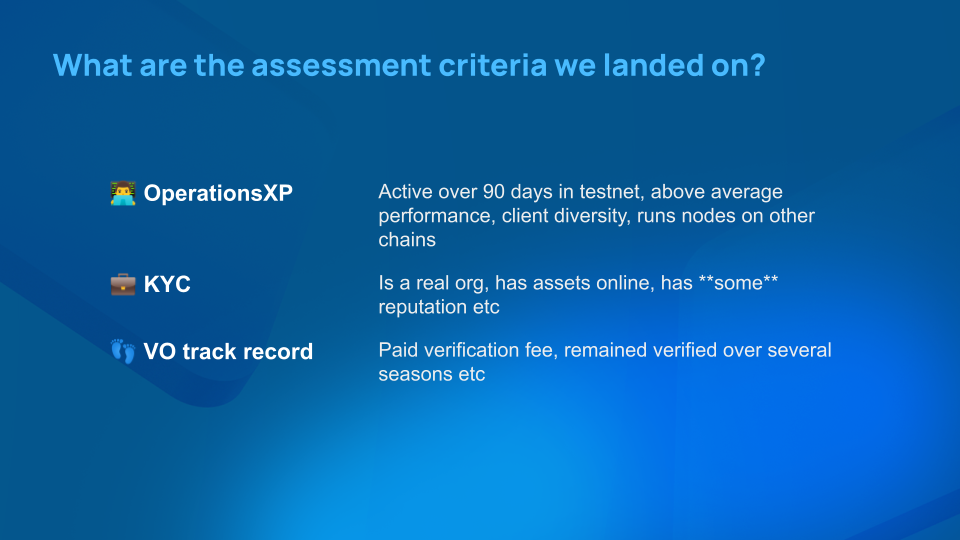
Operations Experience
Problems can occur, whether it’s servers going down, software problems, or a new update sending everything offline. Operators need to be experts in the hardware and software they use. They need to be able to respond to and fix problems fast to prevent validators from being penalized.
In addition to technical aspects, the committee seeks a diversity of experiences and capabilities among the operators. This includes the number of execution and consensus clients they manage, their involvement with other staking protocols, and the geographical breadth of their operations.
KYC
A thorough Know Your Customer (KYC) process ensures the company’s and operator’s transparency and reliability. VOs need to provide proof that they are legitimate through identification or incorporation, proving there is a form of reputation. In the future, the VOC will include a small fee as a way to cover verification costs and reduce possible spam.
Track Record
The VOC employs a broad-ranging set of criteria that consider technological proficiency and performance. This includes consideration of the operator’s engagement with both the SSV Testnet and Mainnet, the duration of their participation in the testnet, and the number of validators run. Another crucial factor is their performance score, reflecting their technical expertise and operational efficiency during testnet time.
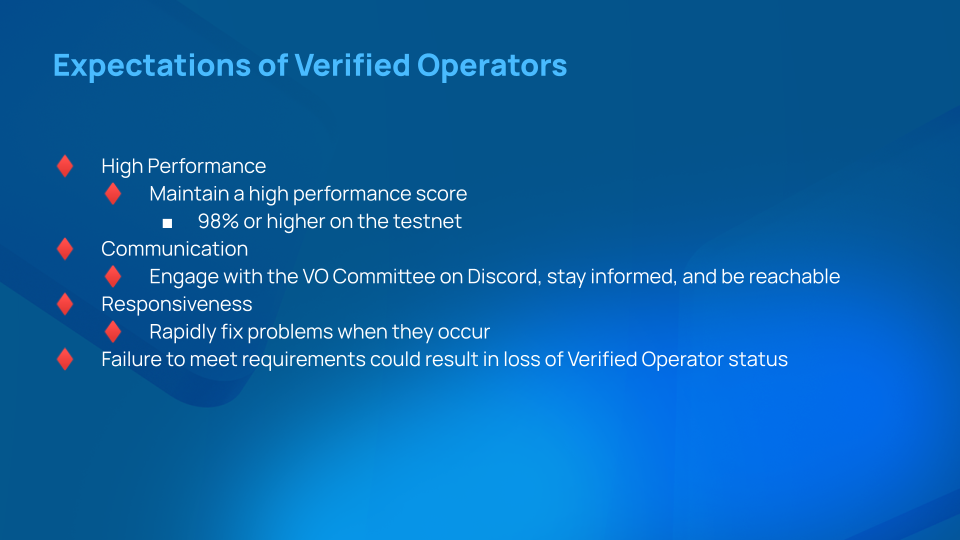
Are you interested in becoming a Verified Operator? If you are an operator looking to level up your game, apply here. Please Note — Applications will open after the Launch phase.
It’s exciting times at the ssv.network. The Mainnet Verified Operators are on board, which brings the project one step closer to a real-life scenario of countless cluster permutations. This will be the first official run of a DVT network ever!
Want the latest alpha? Stay up to date by joining the ssv.network Discord or the Weekly Twitter spaces on Thursdays at 12 pm UTC on Twitter.
Website | Network Hub | Discord | Dev Center | Documentation | GitHub